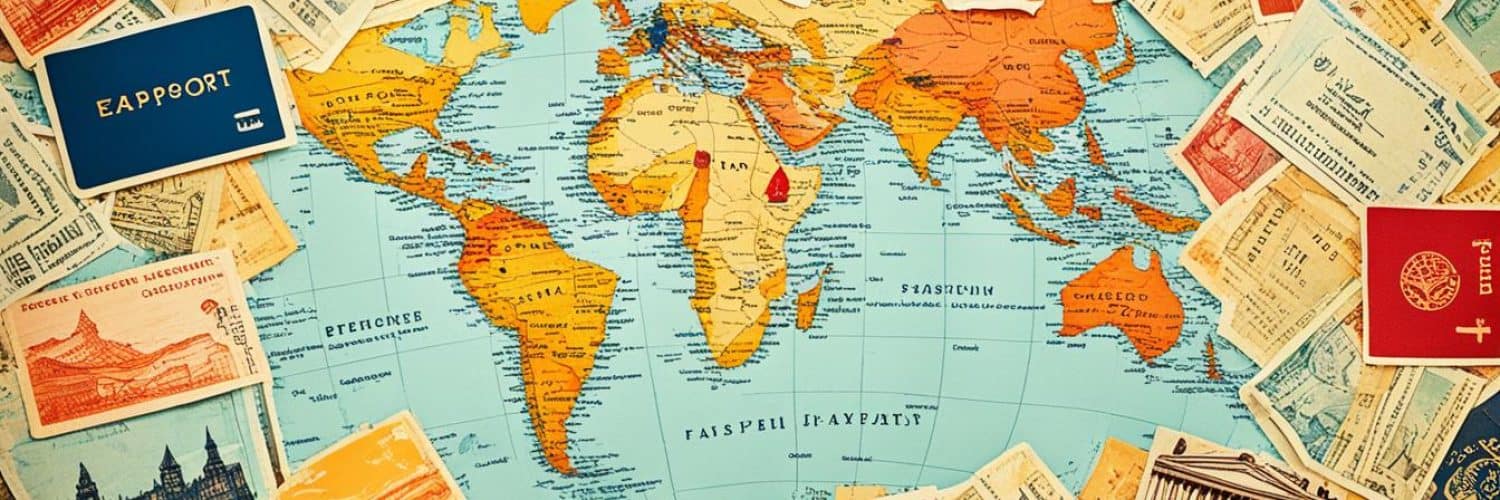Have you ever wondered what it’s like to live and work in a different country? To experience new cultures, expand your horizons, and build a global network of friends and colleagues? If so, you might be curious about what it means to be an expat. What exactly is an expat, and how does their experience differ from that of an immigrant? Let’s delve into the world of expatriates and uncover the answers to these questions.
Key Takeaways:
- An expat is an individual living and/or working in a country other than their country of citizenship.
- Expats may be temporarily residing in another country for work purposes or permanently living abroad.
- Expats can enjoy a range of benefits, such as better job opportunities, new experiences, and lower cost of living.
- However, being an expat also comes with challenges, including adjusting to a new culture and being away from friends and family.
- Understanding expat visa requirements, tax considerations, and building a support network are essential for a successful expat experience.
Key Differences Between Expats and Immigrants
While both expats and immigrants reside in a country other than their home country, there are key differences between the two. Expat is short for expatriate, which refers to individuals living and/or working in a country other than their country of citizenship. They often move for work reasons and may have plans to return to their home country in the future. On the other hand, immigrants are individuals who move with the intention of permanently residing in the new country and becoming citizens.
Here are some of the main differences between expats and immigrants:
- Legal Status: Expats may have different legal statuses depending on their situation, such as being on a temporary work visa or having dual citizenship. Immigrants, on the other hand, typically go through a legal process to obtain permanent residency or citizenship in their new country.
- Rights and Benefits: Due to their temporary status, expats may not have the same rights and benefits as immigrants. Immigrants often have access to social services, healthcare, and other benefits available to citizens.
“While both expats and immigrants contribute to the multicultural fabric of society, it is important to recognize and understand the unique circumstances and experiences of each group.”
It is important to note that the distinction between expats and immigrants can vary depending on the context and the specific definitions used in different countries. However, understanding these differences can provide insight into the motivations and legal considerations of individuals living and working abroad.
Benefits of Being an Expat
Being an expat offers a range of benefits that make the expat lifestyle appealing and rewarding. Expats not only have the opportunity to earn higher salaries and have access to better job opportunities compared to their home country but also enjoy a host of other advantages.
1. New Experiences and Personal Growth
Living abroad exposes expats to new experiences, cultures, and languages, which promotes personal and professional growth. Immersing oneself in a different environment allows for the development of cross-cultural competencies and adaptability. Expats gain a broader worldview, enhancing their understanding and appreciation of global diversity.
2. Lower Cost of Living and Better Climate
Many expats benefit from a lower cost of living in their host country, enabling them to stretch their income further and enjoy a higher standard of living. Additionally, expats may have the opportunity to live in regions with better climates, offering various outdoor activities and a more enjoyable lifestyle.
3. Access to Unique Travel Destinations
Living abroad as an expat often provides the opportunity to explore new and exciting travel destinations. Expats can easily venture out and discover nearby countries, landmarks, and attractions. This access to unique travel experiences enhances the overall expat lifestyle, allowing individuals to create lasting memories and broaden their horizons.
4. Building a Global Network
Being an expat fosters the chance to build a global network of connections and friends from various backgrounds. Expats can engage with both locals and fellow expats, creating a supportive community that shares similar experiences and challenges. These connections can lead to new friendships, career opportunities, and a sense of belonging in their new home.
5. International Experience
Gaining international experience is highly valued in today’s globalized world. Being an expat provides individuals with the opportunity to showcase their adaptability, cross-cultural competencies, and resilience. This international experience enhances one’s professional portfolio, opening doors to global job opportunities and career advancement.
Overall, the benefits of being an expat are wide-ranging and encompass personal, professional, and cultural aspects. Expats have the chance to earn a higher income, explore new cultures, enjoy a lower cost of living, and build lasting connections. The expat lifestyle offers adventure, personal growth, and a unique perspective on the world.
Challenges of Being an Expat
While the expat life offers many advantages, it also comes with its own set of challenges. Living as an expat, away from friends and family, can be emotionally difficult. The distance can create feelings of loneliness and homesickness, especially during the initial stages of relocation.
Another challenge faced by expats is adjusting to a new culture, language, and work environment. Each country has its own customs, traditions, and social norms, which may differ greatly from what expats are accustomed to. Learning to navigate these cultural differences can take time and effort.
Dealing with the legal and administrative procedures of living abroad can also be complex and time-consuming. Expats may need to obtain visas, understand tax obligations, and complete other bureaucratic tasks. This can add an additional layer of stress to the already challenging process of adapting to a new country.
“Living abroad is an adventure that comes with its own set of challenges. Embracing these challenges and viewing them as opportunities for growth can make the expat journey more rewarding.”
Expats often face various challenges, but with the right mindset and support network, they can overcome these obstacles and thrive in their new environment.

Building a support system, both with fellow expats and locals, can help expats navigate the challenges of living abroad. Connecting with others who are going through similar experiences can provide a sense of belonging and understanding. Expats can join expat communities, participate in local activities, and make an effort to learn about and appreciate the local culture.
Remember, being an expat is not without its challenges, but embracing them and approaching them with a positive mindset can lead to personal growth, cultural enrichment, and a truly rewarding expat life.
Retiring Abroad as an Expat
Retiring abroad has increasingly become a preferred choice among expats. Many retirees opt to move to countries with lower living costs, better climates, and access to quality healthcare services. Popular retirement destinations include countries in Central and South America, the Mediterranean, and parts of Europe. Retiring abroad offers the opportunity to maximize savings and enjoy a more relaxed lifestyle. However, it is essential to consider factors such as healthcare, taxes, and legal requirements when planning to retire in a foreign country.
One of the main benefits of retiring abroad is the potential to stretch retirement savings further. In countries with lower living costs, retirees can often maintain a comfortable standard of living with less financial strain. This allows them to fully enjoy their retirement years without worrying about financial constraints.
“Retiring abroad provides a unique opportunity to experience a different culture, climate, and way of life,” says Maria Thompson, a retired expat living in Portugal. “The relaxed lifestyle and proximity to beautiful destinations have allowed me to truly embrace the joy of retirement.”
“Retiring abroad provides a unique opportunity to experience a different culture, climate, and way of life. The relaxed lifestyle and proximity to beautiful destinations have allowed me to truly embrace the joy of retirement.”
– Maria Thompson, Retired Expat
In addition, retiring abroad often offers access to better climates. Many retirees choose to move to countries with mild or tropical climates, allowing them to enjoy pleasant weather year-round. This can significantly enhance their quality of life, as they have the opportunity to engage in outdoor activities and maintain an active and healthy lifestyle.
Access to quality healthcare services is another important consideration for retirees. Some countries are renowned for their excellent healthcare systems, offering affordable healthcare options and a higher standard of care. Retiring in a country with reliable healthcare can provide peace of mind and ensure retirees have the necessary medical support as they age.
The decision to retire abroad requires careful planning and consideration. Retirees should evaluate the healthcare system, cost of living, and legal requirements of their intended destination. It is crucial to research and understand the healthcare options available, including insurance coverage and access to medical facilities. Additionally, retirees need to be aware of tax obligations both in their home country and the country they plan to retire in.
| Benefit | Description |
|---|---|
| Lower living costs | Retirees can enjoy a higher standard of living with potentially lower living costs in certain countries. |
| Favorable climate | Retiring to a country with a desirable climate can enhance the overall retirement experience. |
| Access to healthcare | Retirees can access quality healthcare services at a potentially lower cost compared to their home country. |
Retiring abroad as an expat offers a unique opportunity to embark on a new adventure in retirement. With the right planning and research, retirees can find a destination that meets their needs and provides a fulfilling retirement experience.
Tax Considerations for Expats
Living and working abroad as an expat entails specific tax obligations that individuals need to be aware of. Understanding the U.S. tax code and its provisions is crucial for expats to ensure compliance and optimize their tax situation. Here are some important tax considerations for expats:
Foreign Earned Income Exclusion (FEIE)
The Foreign Earned Income Exclusion (FEIE) is a beneficial provision that allows expats to exclude a certain amount of their foreign income from their U.S. tax return. By taking advantage of the FEIE, expats can reduce their taxable income and potentially pay lower taxes. It is important for expats to accurately calculate and claim the eligible exclusion amount to minimize their tax liability.
Foreign Tax Credit (FTC)
The Foreign Tax Credit (FTC) is another key provision for expats to mitigate potential double taxation. The FTC allows expats to claim a credit for taxes paid to a foreign country on their U.S. tax return. This credit offsets the U.S. tax liability and prevents taxation on the same income in both the foreign country and the United States. By properly utilizing the FTC, expats can reduce their overall tax burden and avoid paying taxes twice.
| FEIE | FTC |
|---|---|
| Allows expats to exclude a portion of their foreign income from U.S. taxation. | Provides a credit for taxes paid to a foreign country. |
| Reduces taxable income and potentially lowers tax liability. | Offsets U.S. tax liability and prevents double taxation. |
| Exclusion amount varies annually and is subject to specific requirements. | Claimable for income taxes paid to a foreign country. |
Expats should carefully evaluate their eligibility for the FEIE and FTC, as these tax provisions can significantly impact their tax liability and financial situation. Additionally, it is crucial for expats to understand any specific reporting requirements and deadlines associated with these tax considerations.
Expatriation Tax
Expats who renounce their U.S. citizenship may be subject to an expatriation tax. This tax is imposed on certain expats who meet specific criteria, such as having a high net worth or failing to comply with certain tax obligations. The expatriation tax aims to discourage individuals from renouncing their citizenship solely for tax avoidance purposes. Expats considering renouncing their citizenship should carefully evaluate the potential tax consequences and seek professional advice before taking any action.
Understanding expat taxes and the available provisions such as the FEIE and FTC is essential for expats to navigate their tax obligations and optimize their financial situation. Consulting with a tax professional who specializes in expat taxation can provide valuable guidance and ensure compliance with U.S. tax laws.
Expatriate Insurance Considerations
Living abroad as an expat presents unique opportunities and challenges, and it is crucial to have the right insurance coverage to protect yourself and your family. Expatriate insurance, specifically expatriate health insurance, is an essential consideration for expats. It provides comprehensive coverage for medical expenses, access to global healthcare providers, and assistance with medical evacuation services.
Expatriate health insurance ensures that you have financial protection in the event of unexpected illness, injury, or accidents while living overseas. It gives you peace of mind, knowing that you can receive quality medical care and assistance wherever you are in the world.
When choosing an expatriate health insurance plan, it is crucial to research and select a plan that suits your specific needs. Consider factors such as coverage for pre-existing conditions, maternity services, emergency services, and prescription medication coverage.
“Having the right expatriate health insurance coverage is like having a safety net that protects you and your loved ones during your time abroad. It gives you the confidence to embrace your expat journey without worrying about unexpected medical expenses.”
Here are some key considerations when selecting an expatriate health insurance plan:
- Coverage: Ensure that the plan provides comprehensive coverage for medical treatment, hospitalization, surgery, and medication.
- Emergency Services: Look for a plan that offers emergency medical evacuation services, as well as 24/7 assistance helpline for immediate support.
- Network of Providers: Check if the plan has a network of preferred healthcare providers in your host country, ensuring convenient access to quality medical services.
- Pre-Existing Conditions: If you have any pre-existing conditions, make sure that the plan provides coverage for them, as exclusions may apply.
- Coverage for Dependents: If you are relocating with your family, consider whether the plan provides coverage for your dependents and their specific needs.
Investing in comprehensive expatriate health insurance will give you the peace of mind to fully embrace your expat experience. It is an essential aspect of your overall financial and personal safety while living abroad.
Expatriate Insurance Plan Comparison
| Insurance Provider | Coverage | Emergency Services | Network of Providers | Pre-Existing Conditions | Coverage for Dependents |
|---|---|---|---|---|---|
| Provider A | Comprehensive coverage for medical expenses, hospitalization, and medication. | 24/7 emergency medical evacuation services with a dedicated helpline. | Extensive network of preferred healthcare providers. | Coverage for pre-existing conditions, subject to certain limitations. | Option for family coverage with dependents included. |
| Provider B | Basic coverage for medical expenses and hospitalization. | Limited emergency medical evacuation services with restricted coverage. | Limited network of healthcare providers. | Exclusions for pre-existing conditions. | No coverage for dependents. |
| Provider C | Comprehensive coverage for medical expenses, hospitalization, and medication. | 24/7 emergency medical evacuation services with a dedicated helpline. | Extensive network of preferred healthcare providers. | Full coverage for pre-existing conditions, subject to certain waiting period. | Family coverage available with dependent benefits. |
When comparing insurance providers, consider the specific coverage, benefits, and limitations provided by each plan. It is important to choose a plan that not only meets your current needs but also allows flexibility and adjustment for any changes that may occur during your expat journey.
Expatriate Visa Requirements
For individuals planning to live and work abroad as expatriates, it is essential to understand the visa requirements of their intended destination. Each country has specific regulations and procedures governing expatriate visas, which grant legal permission to reside and work in the host country. The visa requirements vary depending on the purpose of the expat’s stay and the country’s immigration policies.
Some countries offer working visas specifically designed for individuals moving for employment purposes. These working visas often require sponsorship from an employer, who will provide the necessary documentation and support for the visa application process. Proof of employment, such as a job offer letter or contract, may be required to obtain a working visa.
Other countries may have different visa categories for expatriates, such as investor visas or skilled worker visas. These visas require proof of financial stability or specific qualifications in order to be eligible for application.
When planning to relocate as an expatriate, it is crucial to thoroughly research and understand the visa requirements of the desired destination. The application process may involve submitting various documents, such as a valid passport, medical examinations, and background checks. Additionally, expats may need to provide proof of sufficient funds to support themselves during their stay, as well as proof of health insurance coverage.
Failure to comply with visa requirements can lead to legal issues and potential deportation. It is important to engage with the local embassy or consulate of the host country to ensure a smooth transition and avoid any complications. Seeking professional advice from immigration consultants or lawyers who specialize in expatriate visa applications can also be beneficial.
Benefits of Having the Right Visa
Holding the appropriate expatriate visa provides several advantages. It ensures legal compliance with the host country’s immigration laws, which is crucial for expats looking to establish a stable and secure life abroad. With the right visa, expatriates have the freedom to live and work in their host country without fear of legal repercussions.
Having a valid expatriate visa also facilitates access to various social and legal benefits in the host country. Expats may be eligible for healthcare services, social security, and other government provisions available to legal residents.
Furthermore, having the right visa allows expatriates to confidently pursue career opportunities in their field of expertise. Many employers require proof of work authorization for hiring expatriates, making it essential to have the correct visa documentation.
Visa Types for Expatriates
| Visa Type | Purpose | Requirements |
|---|---|---|
| Working Visa | Employment purposes | Sponsorship from employer, job offer or contract |
| Investor Visa | Investing in the host country’s economy | Proof of substantial financial investment |
| Skilled Worker Visa | Specific qualifications and skills | Evidence of qualifications and job prospects |
Table: Examples of common visa types for expatriates and their purposes.
It is important to note that visa requirements and types may vary significantly among countries. Some countries may have specific agreements in place, allowing certain nationalities to enter with more ease or under specific visa categories. Expats should consult official government resources or seek professional advice to obtain accurate and up-to-date information regarding visa requirements for their specific circumstances.
In conclusion, understanding the expatriate visa requirements of the host country is crucial for a successful transition and legal compliance. Expats should thoroughly research the visa options, consult with experts, and provide all necessary documents to ensure a smooth and hassle-free visa application process. Holding the correct visa type not only provides legal permission to live and work abroad but also grants access to various benefits and opportunities in the host country.
Adjusting to a New Culture as an Expat
Adjusting to a new culture can be one of the biggest challenges for expats. Each country has its own customs, traditions, and social norms. Expats should be open-minded and willing to learn and adapt to the local culture.
Learning the local language can greatly enhance the expat experience and facilitate communication with locals. By making an effort to understand and speak the language, expats can break down barriers and form meaningful connections. It also shows respect and appreciation for the local culture.
Embracing cultural differences is key to successful integration. Rather than viewing differences as obstacles, expats should approach them with curiosity and an open heart. By respecting and appreciating the cultural nuances they encounter, expats can foster positive relationships and create a sense of belonging.
âThe more you understand culture, the more you understand yourself and the world around you.â – Claudia Lee, Expat Blogger
It’s important for expats to engage with the local community and participate in cultural activities. This can include attending festivals, trying local cuisine, and immersing oneself in the customs and traditions of the host country. By actively participating, expats can deepen their understanding of the culture and feel more connected to their new home.
The Benefits of Cultural Exchange
The process of adjusting to a new culture opens doors to personal growth and development. Expats gain a broader perspective of the world, expanding their horizons and challenging their assumptions. It allows for self-reflection and an opportunity to question one’s own beliefs and values.
The exchange of ideas and experiences between cultures fosters creativity and innovation. By embracing different perspectives, expats can develop new ways of thinking and problem-solving. This can have a profound impact on their personal and professional lives.
Moreover, adjusting to a new culture strengthens adaptability, resilience, and interpersonal skills. Expats learn to navigate unfamiliar situations, build relationships across cultural boundaries, and thrive in diverse environments. These skills are highly sought after by employers and can enhance career prospects both abroad and back home.
| Challenges of Adjusting to a New Culture | Tips for Successfully Adjusting |
|---|---|
| Language barriers | Take language classes Practice speaking with locals Immerse yourself in the language |
| Feeling homesick and lonely | Join local expat groups Participate in social activities Stay connected with loved ones |
| Cultural misunderstandings | Observe and learn from locals Ask questions and seek clarification Show respect and adapt to local customs |
| Adjusting to different work culture | Observe and learn how locals approach work Communicate openly with colleagues Seek guidance from mentors |
Adjusting to a new culture requires time, patience, and an open mind. It is a journey of self-discovery and growth. By embracing the unfamiliar and immersing oneself in the local culture, expats can create a fulfilling and memorable experience abroad.
Building a Support System as an Expat
Building a support system is crucial for expats to navigate the challenges of living abroad. As an expat, it’s important to connect with others who understand the unique experiences and emotions that come with living in a foreign country. You can seek out fellow expats from your home country or engage with expat communities in your host country. These communities provide a sense of familiarity and support, offering opportunities for socialization, networking, and shared experiences.
Joining local groups and organizations related to your interests and hobbies is another great way to connect with the local community. By engaging in activities you enjoy, you’ll have the opportunity to meet like-minded individuals and form meaningful connections. Whether it’s joining a sports club, volunteering for a cause, or attending cultural events, these activities can help you feel more integrated and connected in your new environment.
Having a support network as an expat can significantly ease the transition and provide a sense of belonging. It allows you to lean on others for guidance, advice, and emotional support. Your support system can offer valuable insights into navigating everyday challenges, such as understanding local customs, finding the best places to shop, or even coping with homesickness.
“Surround yourself with people who support and uplift you. Expats communities are a treasure trove of knowledge and friendship.”
To illustrate the importance of building a support system, here is an example of a table showcasing the benefits of connecting with expat communities:
| Benefits of Connecting with Expat Communities | Explanation |
|---|---|
| Opportunities for socialization | Meet new people, make friends, and expand your social circle. |
| Shared experiences | Engage with others who understand the challenges and joys of living abroad. |
| Networking | Discover professional opportunities, share information, and connect with professionals in your field. |
| Support and guidance | Receive emotional support, practical tips, and advice from those who have been in your shoes. |
| Cultural immersion | Immerse yourself in the local culture through events, language exchanges, and cultural activities. |
Remember, building a support system takes time and effort. Be proactive in seeking out opportunities to connect with others, both within the expat community and the local community. Embrace the chance to learn from people of different backgrounds and cultures. Building relationships and connections will not only help you navigate the challenges of living abroad but also enhance your overall expat experience.
Tips for a Successful Expat Experience
Living abroad as an expat can be a rewarding and transformative experience. To make the most of your time in a new country, consider these helpful tips:
- Learn About the Local Culture: Before moving abroad, take the time to research and learn about the local culture, customs, and traditions. This will help you better understand and navigate your new environment.
- Build a Support System: Moving to a new country can be overwhelming, so it’s important to build a strong support system. Connect with other expats, join local clubs or organizations, and maintain connections with loved ones back home.
- Stay Informed: Familiarize yourself with the legal requirements, rights, and responsibilities in your host country. This includes understanding visa regulations, healthcare systems, and local laws.
- Embrace New Experiences: Living abroad offers countless opportunities for personal growth and cultural immersion. Be open-minded, try new things, and embrace the unknown. This will allow you to fully experience and appreciate your new surroundings.
- Be Adaptable: Moving to a new country often means adjusting to a different way of life. Stay flexible and adaptable, as things may not always go according to plan. Embracing change and unexpected circumstances will make your expat journey smoother.
- Maintain a Positive Mindset: Living abroad can present challenges, but maintaining a positive mindset is key. Focus on the benefits of your expat experience, celebrate accomplishments, and learn from setbacks. A positive attitude will help you overcome obstacles and make the most of your time abroad.
âLiving abroad as an expat is an adventure full of new experiences and opportunities. Embrace the challenges and uncertainties that come with it, and you’ll discover a world of personal and professional growth.â
Remember, every expat journey is unique, so find what works best for you. By following these tips, you’ll be well-prepared for a successful and fulfilling expat experience.

The Expatriate Lifestyle
The expatriate lifestyle offers a thrilling and fulfilling experience for individuals living overseas. It is characterized by an adventurous spirit, independence, and an immersive cultural journey.
Expats have the opportunity to explore new places, immerse themselves in diverse cultures, and try exotic cuisines. The expat lifestyle often involves frequent travel, allowing individuals to broaden their horizons and gain unique perspectives.
The expatriate lifestyle is a catalyst for personal growth and career advancement. By embracing the challenges and uncertainties that come with living overseas, expats develop resilience, adaptability, and a deeper appreciation for global diversity.
Filled with vibrant experiences and exciting opportunities, the expat lifestyle encourages individuals to step out of their comfort zones and embrace new possibilities.
Engaging with Diverse Communities
Living overseas as an expat offers the chance to engage with diverse communities from different backgrounds and cultures. This exposure fosters cultural understanding, empathy, and social connections. Expats have the opportunity to build meaningful relationships and connections with people from all walks of life.
Exploring New Horizons
One of the most thrilling aspects of the expat lifestyle is the chance to explore new horizons. From iconic landmarks to hidden gems, every destination offers a unique charm waiting to be discovered. Expats can truly immerse themselves in the local culture, traditions, and customs, gaining a deeper understanding of the host country.
A Sense of Independence
The expat lifestyle encourages individuals to become more self-reliant and independent. Living overseas often means navigating unfamiliar territories, facing challenges head-on, and finding innovative solutions. Expats develop a sense of resilience and self-confidence that extends beyond their time abroad.
Quotes from Fellow Expats
“Living as an expat has been the most transformative experience of my life. It has opened my eyes to different cultures, expanded my perspective, and given me the courage to embrace change.”
“The expat lifestyle has provided me with endless opportunities to learn, grow, and challenge myself. It has taught me how to adapt to new environments and embrace the unknown with excitement rather than fear.”
The Rewards of the Expat Lifestyle
The expatriate lifestyle offers countless rewards. Expats gain cultural fluency, adaptability, and a global mindset that are highly valued in today’s interconnected world. They develop a deeper appreciation for diversity and a broader understanding of different perspectives, enriching both their personal and professional lives.
| Rewards of the Expat Lifestyle |
|---|
| Personal Growth |
| Career Advancement |
| Global Perspective |
The expat lifestyle encourages individuals to embrace change, discover their true potential, and create unforgettable memories along the way. It is a transformative journey that shapes individuals into global citizens, equipped with the skills and experiences to thrive in an ever-changing world.
Repatriation Considerations for Expats
Repatriation is the process of returning to your home country after living abroad as an expat. While the prospect of returning to familiar surroundings may initially seem comforting, it is important for expats to be aware of the potential challenges and adjustments that come with repatriation.
After spending an extended period abroad, expats may experience what is known as reverse culture shock. This phenomenon occurs when individuals struggle to readjust to their home country’s culture, norms, and way of life. The once-familiar environment may now feel foreign, leading to feelings of disorientation and a sense of not belonging.
It is crucial for expats to give themselves time to adapt and seek support if needed during the repatriation process. Connecting with other expats who have gone through a similar transition can provide invaluable guidance and understanding. Additionally, exploring resources and communities focused on repatriation can help expats navigate the challenges and emotions that arise.
“Repatriation is not simply returning to your home country; it’s about readjusting to the changes that have occurred within you.”
During the repatriation process, expats may also face the challenge of reintegrating into their home country’s job market. The skills and experiences gained abroad may be valuable, but it is essential to understand how they align with local market demands. Networking, updating resumes, and fine-tuning job search strategies can help expats find new opportunities or smoothly transition back to their previous employment.
Repatriation Checklist
As expats prepare for repatriation, the following checklist can serve as a helpful guide:
- Evaluate personal and professional goals for repatriation.
- Connect with other expats who have gone through repatriation for advice and support.
- Research and understand changes in your home country’s laws, regulations, and policies.
- Update resumes and professional profiles to highlight international experience.
- Network with local professionals and attend industry-related events.
- Re-establish personal and professional networks in your home country.
- Take care of practical matters, such as housing, healthcare, and financial planning.
- Stay open-minded and be patient with the adjustment process.
By considering these factors and planning ahead, expats can navigate the repatriation process successfully and embrace their new chapter in their home country.
| Benefits | Challenges |
|---|---|
| Reuniting with family and friends | Reverse culture shock |
| Opportunity for new career prospects | Difficulty reintegrating into the job market |
| Reconnecting with familiar surroundings | Social and professional readjustment |
| Access to familiar support systems | Loss of expat lifestyle and experiences |
The Impact of Being an Expat on Personal and Professional Growth
Being an expat can be a transformative experience that has a profound impact on personal and professional growth. When you live and work in a different country, you are exposed to new perspectives, challenges, and opportunities that can shape who you become.
As an expat, you develop cross-cultural competencies, adaptability, and resilience. These qualities are highly valued in today’s globalized world, where companies and organizations are increasingly seeking individuals who can effectively navigate diverse environments. Your international experience as an expat can enhance your career prospects and open doors to global job opportunities.
On a personal level, the expat journey often leads to personal growth and self-discovery. Living in a different country requires stepping out of your comfort zone and embracing new experiences. Through this process, you develop a greater sense of independence, self-confidence, and a broader worldview. You learn to navigate unfamiliar situations, communicate with people from different backgrounds, and become more adaptable in the face of change.
“Being an expat is like being in a constant state of personal and professional development. It pushes you to grow and surpass your own expectations, both personally and in your career. The experiences I had as an expat have made me a better version of myself.”
An expat’s international experience also enriches their perspective and brings a unique set of skills and insights to the table. The ability to work effectively in multicultural teams, understand diverse customer needs, and navigate global markets are invaluable assets in today’s interconnected world.
Benefits of Being an Expat on Personal and Professional Growth:
- Development of cross-cultural competencies and adaptability
- Increased self-confidence and independence
- Expanded worldview and cultural awareness
- Enhanced communication and interpersonal skills
- Greater resilience and ability to navigate change
- Improved problem-solving and decision-making abilities
- Global network and access to diverse perspectives
These benefits are not only valuable during your time as an expat but also have a lasting impact on your personal and professional development. The skills and experiences gained as an expat can position you ahead in your career, opening doors to new opportunities and providing a competitive edge.

| Personal Growth | Professional Development |
|---|---|
| Increased self-confidence and independence | Development of cross-cultural competencies |
| Expanded worldview and cultural awareness | Enhanced problem-solving abilities |
| Greater resilience and adaptability | Improved communication skills |
| Ability to navigate change | Access to diverse perspectives through global network |
Conclusion
Being an expat offers a unique and transformative experience, with both benefits and challenges. It is an opportunity for individuals to step out of their comfort zone and immerse themselves in a new culture, gaining personal and professional growth along the way.
To make the most of the expat life, thorough research and preparation are essential. Understanding tax obligations, visa requirements, and cultural differences will help expats navigate the challenges that may arise during their journey.
Building a strong support system is also crucial. Connecting with fellow expats and local communities can provide a sense of belonging and support, making the transition smoother and more enjoyable. Staying adaptable and open-minded will enable expats to embrace new experiences and successfully integrate into their host country.
Living as an expat offers numerous opportunities for personal and professional growth. The exposure to different perspectives, languages, and cultures fosters a broader worldview and enhances cross-cultural competencies. Ultimately, the expat life allows individuals to expand their horizons, gain valuable international experience, and create a truly enriching chapter in their life journey.
FAQ
What is an expat?
An expat, or expatriate, refers to an individual living and/or working in a country other than their country of citizenship.
What is the difference between an expat and an immigrant?
While both expats and immigrants live in a country other than their home country, expats often move for work reasons and may have plans to return to their home country, whereas immigrants typically move with the intention of permanently residing in the new country.
What are the benefits of being an expat?
Being an expat offers the opportunity to earn higher salaries, access better job opportunities, experience new cultures, and enjoy a lower cost of living. Expats can also build a global network and gain valuable international experience.
What are the challenges of being an expat?
Some challenges of being an expat include being away from family and friends, adjusting to a new culture and language, dealing with legal and administrative procedures, and experiencing loneliness and homesickness.
What are the benefits of retiring abroad as an expat?
Retiring abroad allows individuals to enjoy a lower cost of living, better climate, and access to healthcare services. It can also provide an opportunity to stretch savings and enjoy a more relaxed lifestyle.
What tax considerations should expats be aware of?
Expats should understand their tax obligations, including provisions such as the Foreign Earned Income Exclusion and the Foreign Tax Credit, to reduce double taxation. They may also be subject to an expatriation tax if they renounce their citizenship.
What insurance considerations should expats have?
Expats should consider expatriate health insurance to cover medical expenses, evacuation services, and access to global healthcare providers. This type of insurance provides financial protection in case of illness, injury, or accidents while living overseas.
What visa requirements are there for expats?
The specific visa requirements vary depending on the country and purpose of stay. Some countries offer working visas, while others require sponsorship or proof of financial stability. Expats should research and understand the visa requirements of their intended destination.
How can expats adjust to a new culture?
Expats can adjust to a new culture by being open-minded, willing to learn and adapt, and by learning the local language. Respecting and appreciating cultural differences is also important for successful integration.
How can expats build a support system?
Expats can seek out fellow expats or join expat communities to connect with others who have similar experiences. They can also join local groups and organizations related to their interests to connect with the local community.
What tips can contribute to a successful expat experience?
To have a successful expat experience, it is important to be prepared, proactive, and embrace new experiences. This includes learning about the local culture, building a support system, and staying informed about rights and legal obligations.
What is the expatriate lifestyle like?
What should expats consider when repatriating?
Repatriation, or returning to one’s home country, can come with challenges such as reverse culture shock and readjustment. Expats should give themselves time to adapt and seek support if needed during the repatriation process.
How does being an expat impact personal and professional growth?
Being an expat provides opportunities for personal and professional growth by developing cross-cultural competencies, adaptability, and resilience. The international experience gained as an expat can enhance career prospects and provide a broader worldview.
What is the conclusion about being an expat?
Being an expat offers a unique and transformative experience with both benefits and challenges. It is important for individuals considering the expat life to thoroughly research and prepare for the journey to ensure a fulfilling and rewarding experience.


















Add comment